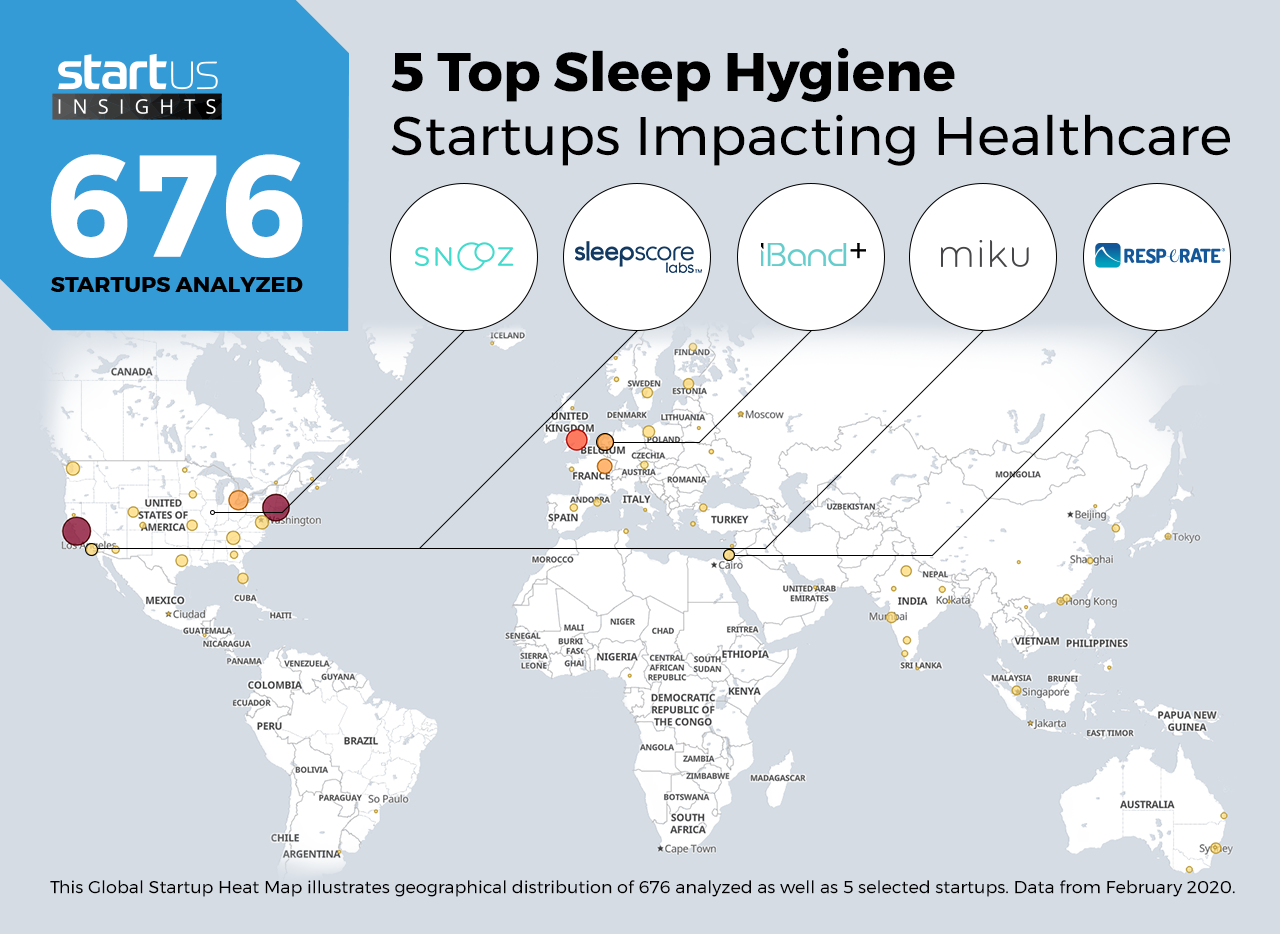Our Innovation Analysts recently looked into emerging technologies and up-and-coming startups working on solutions for the healthcare sector. As there is a large number of startups working on a wide variety of solutions, we want to share our insights with you. This time, we are taking a look at 5 promising sleep hygiene startups.
Heat Map: 5 Top Sleep Hygiene Startups
For our 5 top picks, we used a data-driven startup scouting approach to identify the most relevant solutions globally. The Global Startup Heat Map below highlights 5 interesting examples out of 676 relevant solutions. Depending on your specific needs, your top picks might look entirely different.
SleepScore – Mobile App & Artificial Intelligence (AI)
Artificial Intelligence in the form of a sensor embedded into apps and gadgets helps people to improve their sleep. These sensors measure sleep patterns based on different metrics such as body movement, breathing patterns, heart rate, and brain activity. Based on this data, machine learning algorithms give personalized recommendations on how to improve an individual’s sleep quality.
The US-American startup SleepScore builds an app that uses the microphone and speaker of a smartphone to track the breathing rate and movement of its owner during the night. It monitors each sleep cycle and its duration, how long it takes to fall asleep and overall sleep duration. The app uses big data analytics to compare sleep performance to a typical demographic profile and offer personalized sleep coaching.
Miku – Camera & Computer Vision Technology
Advanced computer vision technology provides a good understanding of sleep quality, especially for babies and infants. Devices that feature this technology are usually located next to a baby to track movement, sleeping, crying, other habits as well as important environmental conditions. The system reports to the caregiver if needed and provides useful tips on how to optimize sleep.
Miku, a startup based in the US, develops a baby video monitor to track breathing, sounds, sleeping patterns, room temperature, and humidity without physical contact. The sensors also don’t require any wires or wearables to work. Instead, the device works with a smartphone and alerts the infant’s parents in the case of changes in the baby’s vitals or other conditions.
SNOOZ – Sound Machines & Sound Therapy
Creating the perfect sleep environment can be difficult. Sleep machines are designed to create a constant neutral sound background, also called white noise. Natural sound compositions like rain, waterfall, fireplace, forest, mountains, or other specific sounds help to relax the body and mind and ensure fast, deep and restorative sleep.
The USA-based company SNOOZ works on a portable white noise machine that creates the sound via a fan inside the machine and has 10 different tones of sound to choose from. It is integrated with a smartphone app, all features (schedule, programs) of the white noise machine are controlled remotely from the user’s phone.
Resperate – Wearables & Breathing Coaching
Breathing exercises help to reduce stress and anxiety, which is especially important at bedtime. Feeling (or hearing) a breathing rhythm subconsciously influences one’s own breathing rhythm, slows it down or speeds it up, depending on the surrounding breathing sound.
The Israeli startup Resperate creates 2Breathe – a guided-breathing algorithm to deliver breathing exercises effectively. The company’s device works via wearable and a mobile app and helps users to fall asleep faster and stay asleep longer. Sensors in the wearable part detect a person’s breathing pattern and send data to the smartphone. The application then analyzes the data and produces customized guiding tones to manage breathing.
iBand+ – EEG Sleep Monitors
The electroencephalogram (EEG) is the most common tool used in sleep research. High-tech sleep-monitoring devices combine brain wave–reading electrodes with artificial intelligence to provide accurate readings of sleep patterns. These devices monitor the electrical activity of the brain, head movement, heart rate, and respiration rate among other parameters, and give feedback to improve sleep.
iBand+, a Dutch company, designs an EEG brain sensing and health tracking headband that monitors and analyzes users’ brainwaves, body movement, heart rate, and body temperature to accurately recognize different sleep phases. The app is customizable and allows users to set audio-visual recommendations. It also includes sleep meditation techniques to relax the brain activity.
What About The Other 671 Solutions?
While we believe data is key to creating insights it can be easy to be overwhelmed by it. Our ambition is to create a comprehensive overview and provide actionable innovation intelligence for your Proof of Concept (PoC), partnership, or investment targets. The 5 sleep hygiene startups showcased above are promising examples out of 676 we analyzed for this article. To identify the most relevant solutions based on your specific criteria and collaboration strategy, get in touch.


![AI in Healthcare: A Strategic Guide for Industry Leaders [2025-2030]](https://www.startus-insights.com/wp-content/uploads/2025/03/AI-in-Healthcare-SharedImg-StartUs-Insights-noresize-420x236.webp)






